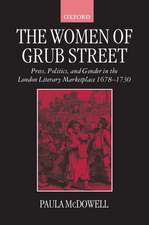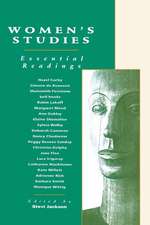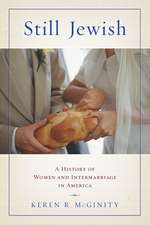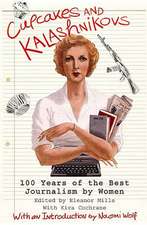Impossible to Hold – Women and Culture in the 1960s
Autor Avital Bloch, Lauri Umanskyen Limba Engleză Hardback – 31 ian 2005
| Toate formatele și edițiile | Preț | Express |
|---|---|---|
| Paperback (1) | 244.35 lei 6-8 săpt. | |
| MI – New York University – 31 ian 2005 | 244.35 lei 6-8 săpt. | |
| Hardback (1) | 528.69 lei 6-8 săpt. | |
| MI – New York University – 31 ian 2005 | 528.69 lei 6-8 săpt. |
Preț: 528.69 lei
Preț vechi: 686.61 lei
-23% Nou
Puncte Express: 793
Preț estimativ în valută:
101.16€ • 105.91$ • 83.71£
101.16€ • 105.91$ • 83.71£
Carte tipărită la comandă
Livrare economică 05-19 aprilie
Preluare comenzi: 021 569.72.76
Specificații
ISBN-13: 9780814799093
ISBN-10: 0814799094
Pagini: 342
Ilustrații: photographs
Dimensiuni: 153 x 229 x 15 mm
Greutate: 0.58 kg
Ediția:New.
Editura: MI – New York University
ISBN-10: 0814799094
Pagini: 342
Ilustrații: photographs
Dimensiuni: 153 x 229 x 15 mm
Greutate: 0.58 kg
Ediția:New.
Editura: MI – New York University
Recenzii
"A superb accomplishment that assembles lively, spirited writing about women, some well-known and others less so, who made a difference in the way we live our lives today."
The Journal of American History "For too long, cultural historians of the Sixties have marginalized women, and womens historians of that period have privileged the political over the cultural. At last, Lauri Umansky and Avital Bloch have had the good sense to bring together womens history and cultural history in order to advance a gendered understanding of the cultural revolution of the Sixties. Through the lives of women as varied as folksinger Joan Baez, poet Sonia Sanchez, and artist Judy Chicago, Impossible to Hold reveals the centrality of women to the culture of the Sixties, and the significance of the cultural to women."
Alice Echols, Professor of English, USC, and author of Scars of Sweet Paradise: The Life and Times of Janis Joplin "By emphasizing community, inclusivity, andthe political dimensions of cultural change, the women in this voulme forged and fostered an important set of alternatives to the dominant culture...As a result, these artists helped shift the mixed-gender 'mainstream' by shaping countercultural trends and visions. They may have been 'impossible' to restrain, but the contributions they made to American culture and life were lasting and concrete."
H-Net "Too often we think that the womens movement burst onto the sixties scene late in the decade. Avital Bloch and Lauri Umansky have assembled a wonderful and varied set of essays to revise that notion. Here are women from throughout the era, staking their claims to central roles in American culture and, by their words and actions, demonstrating the centrality of thefemale experience to that culture. The array of subjects includes many names we have known--Joan Baez, Billie Jean King, Diana Ross, Yoko Ono, Jane Fonda--as well as many we will know now, because of this important and compelling collection."
Alexander Bloom, author of Takin It to the Streets and Long Time Gone: Sixties America Then and Now "One of the strongest aspects of this book is that it ignores the usual female suspects in discussions of the sixties. It also focuses on women and the culture of the sixties instead of feminism during the sixties. Almost none of the women profiled in the text self-identified as feminists, yet their cultural contributions helped make a huge impact for women of future generations."
Altar Magazine "The 1960s continues to resonate as an era of great interest, and this collection of articles...provides an exceptional contribution to the existing literature....This is indeed a collection worthy of attention."
CHOICE
"A superb accomplishment that assembles lively, spirited writing about women, some well-known and others less so, who made a difference in the way we live our lives today." --The Journal of American History "For too long, cultural historians of the Sixties have marginalized women, and women's historians of that period have privileged the political over the cultural. At last, Lauri Umansky and Avital Bloch have had the good sense to bring together women's history and cultural history in order to advance a gendered understanding of the cultural revolution of the Sixties. Through the lives of women as varied as folksinger Joan Baez, poet Sonia Sanchez, and artist Judy Chicago, Impossible to Hold reveals the centrality of women to the culture of the Sixties, and the significance of the cultural to women." --Alice Echols, Professor of English, USC, and author of Scars of Sweet Paradise: The Life and Times of Janis Joplin "By emphasizing community, inclusivity, andthe political dimensions of cultural change, the women in this voulme forged and fostered an important set of alternatives to the dominant culture...As a result, these artists helped shift the mixed-gender 'mainstream' by shaping countercultural trends and visions. They may have been 'impossible' to restrain, but the contributions they made to American culture and life were lasting and concrete." --H-Net "Too often we think that the women's movement burst onto the sixties scene late in the decade. Avital Bloch and Lauri Umansky have assembled a wonderful and varied set of essays to revise that notion. Here are women from throughout the era, staking their claims to central roles in American culture and, by their words and actions, demonstrating the centrality of thefemale experience to that culture. The array of subjects includes many names we have known--Joan Baez, Billie Jean King, Diana Ross, Yoko Ono, Jane Fonda--as well as many we will know now, because of this important and compelling collection." --Alexander Bloom, author of Takin' It to the Streets and Long Time Gone: Sixties America Then and Now "One of the strongest aspects of this book is that it ignores the usual female suspects in discussions of the sixties. It also focuses on women and the culture of the sixties instead of feminism during the sixties. Almost none of the women profiled in the text self-identified as feminists, yet their cultural contributions helped make a huge impact for women of future generations." -- Altar Magazine "The 1960s continues to resonate as an era of great interest, and this collection of articles...provides an exceptional contribution to the existing literature...This is indeed a collection worthy of attention." --CHOICE
The Journal of American History "For too long, cultural historians of the Sixties have marginalized women, and womens historians of that period have privileged the political over the cultural. At last, Lauri Umansky and Avital Bloch have had the good sense to bring together womens history and cultural history in order to advance a gendered understanding of the cultural revolution of the Sixties. Through the lives of women as varied as folksinger Joan Baez, poet Sonia Sanchez, and artist Judy Chicago, Impossible to Hold reveals the centrality of women to the culture of the Sixties, and the significance of the cultural to women."
Alice Echols, Professor of English, USC, and author of Scars of Sweet Paradise: The Life and Times of Janis Joplin "By emphasizing community, inclusivity, andthe political dimensions of cultural change, the women in this voulme forged and fostered an important set of alternatives to the dominant culture...As a result, these artists helped shift the mixed-gender 'mainstream' by shaping countercultural trends and visions. They may have been 'impossible' to restrain, but the contributions they made to American culture and life were lasting and concrete."
H-Net "Too often we think that the womens movement burst onto the sixties scene late in the decade. Avital Bloch and Lauri Umansky have assembled a wonderful and varied set of essays to revise that notion. Here are women from throughout the era, staking their claims to central roles in American culture and, by their words and actions, demonstrating the centrality of thefemale experience to that culture. The array of subjects includes many names we have known--Joan Baez, Billie Jean King, Diana Ross, Yoko Ono, Jane Fonda--as well as many we will know now, because of this important and compelling collection."
Alexander Bloom, author of Takin It to the Streets and Long Time Gone: Sixties America Then and Now "One of the strongest aspects of this book is that it ignores the usual female suspects in discussions of the sixties. It also focuses on women and the culture of the sixties instead of feminism during the sixties. Almost none of the women profiled in the text self-identified as feminists, yet their cultural contributions helped make a huge impact for women of future generations."
Altar Magazine "The 1960s continues to resonate as an era of great interest, and this collection of articles...provides an exceptional contribution to the existing literature....This is indeed a collection worthy of attention."
CHOICE
"A superb accomplishment that assembles lively, spirited writing about women, some well-known and others less so, who made a difference in the way we live our lives today." --The Journal of American History "For too long, cultural historians of the Sixties have marginalized women, and women's historians of that period have privileged the political over the cultural. At last, Lauri Umansky and Avital Bloch have had the good sense to bring together women's history and cultural history in order to advance a gendered understanding of the cultural revolution of the Sixties. Through the lives of women as varied as folksinger Joan Baez, poet Sonia Sanchez, and artist Judy Chicago, Impossible to Hold reveals the centrality of women to the culture of the Sixties, and the significance of the cultural to women." --Alice Echols, Professor of English, USC, and author of Scars of Sweet Paradise: The Life and Times of Janis Joplin "By emphasizing community, inclusivity, andthe political dimensions of cultural change, the women in this voulme forged and fostered an important set of alternatives to the dominant culture...As a result, these artists helped shift the mixed-gender 'mainstream' by shaping countercultural trends and visions. They may have been 'impossible' to restrain, but the contributions they made to American culture and life were lasting and concrete." --H-Net "Too often we think that the women's movement burst onto the sixties scene late in the decade. Avital Bloch and Lauri Umansky have assembled a wonderful and varied set of essays to revise that notion. Here are women from throughout the era, staking their claims to central roles in American culture and, by their words and actions, demonstrating the centrality of thefemale experience to that culture. The array of subjects includes many names we have known--Joan Baez, Billie Jean King, Diana Ross, Yoko Ono, Jane Fonda--as well as many we will know now, because of this important and compelling collection." --Alexander Bloom, author of Takin' It to the Streets and Long Time Gone: Sixties America Then and Now "One of the strongest aspects of this book is that it ignores the usual female suspects in discussions of the sixties. It also focuses on women and the culture of the sixties instead of feminism during the sixties. Almost none of the women profiled in the text self-identified as feminists, yet their cultural contributions helped make a huge impact for women of future generations." -- Altar Magazine "The 1960s continues to resonate as an era of great interest, and this collection of articles...provides an exceptional contribution to the existing literature...This is indeed a collection worthy of attention." --CHOICE
Notă biografică
Avital H. Bloch is research professor at the Center for Social Research, University of Colima, Mexico. and author of Politics, Political Thought, and Historiography in the Contemporary United States.
Descriere
Descriere de la o altă ediție sau format:
With Jackie in a pill-box hat and Marilyn crooning to the president, the 1960s opened with women hovering at the fringes of the public imagination - and ended with a feminist movement that outpaced anything NASA could concoct. A compelling story, but did it really happen that way? Yes and no, argue Lauri Umansky and Avital Bloch.
With Jackie in a pill-box hat and Marilyn crooning to the president, the 1960s opened with women hovering at the fringes of the public imagination - and ended with a feminist movement that outpaced anything NASA could concoct. A compelling story, but did it really happen that way? Yes and no, argue Lauri Umansky and Avital Bloch.























